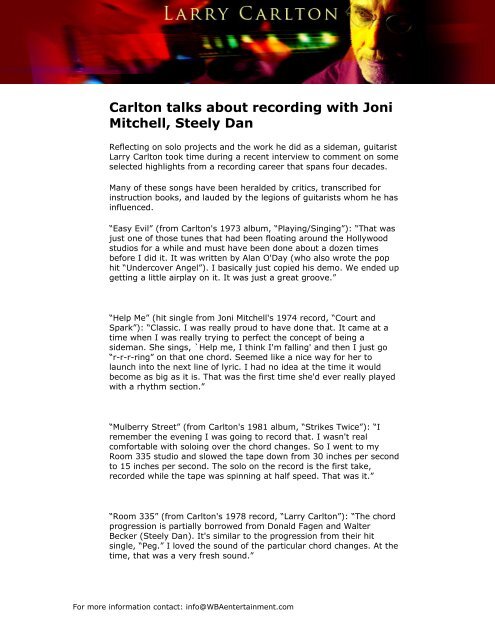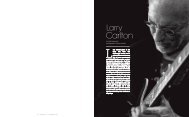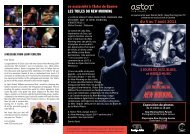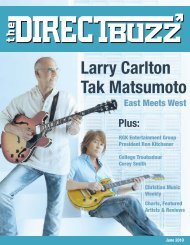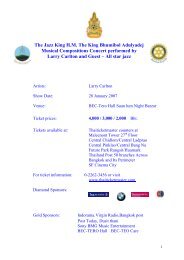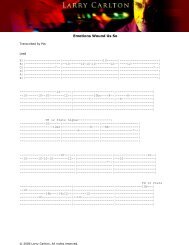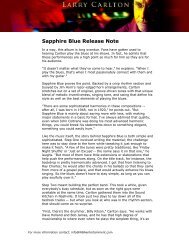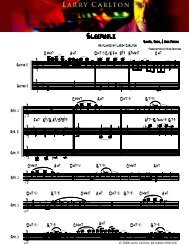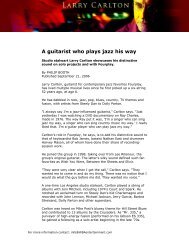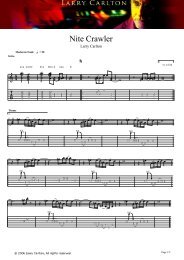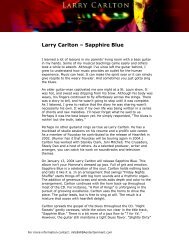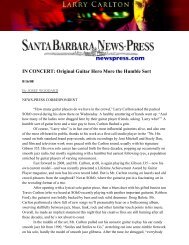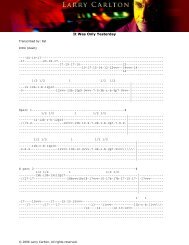Carlton talks about recording with Joni Mitchell ... - Larry Carlton
Carlton talks about recording with Joni Mitchell ... - Larry Carlton
Carlton talks about recording with Joni Mitchell ... - Larry Carlton
You also want an ePaper? Increase the reach of your titles
YUMPU automatically turns print PDFs into web optimized ePapers that Google loves.
<strong>Carlton</strong> <strong>talks</strong> <strong>about</strong> <strong>recording</strong> <strong>with</strong> <strong>Joni</strong><br />
<strong>Mitchell</strong>, Steely Dan<br />
Reflecting on solo projects and the work he did as a sideman, guitarist<br />
<strong>Larry</strong> <strong>Carlton</strong> took time during a recent interview to comment on some<br />
selected highlights from a <strong>recording</strong> career that spans four decades.<br />
Many of these songs have been heralded by critics, transcribed for<br />
instruction books, and lauded by the legions of guitarists whom he has<br />
influenced.<br />
“Easy Evil” (from <strong>Carlton</strong>'s 1973 album, “Playing/Singing”): “That was<br />
just one of those tunes that had been floating around the Hollywood<br />
studios for a while and must have been done <strong>about</strong> a dozen times<br />
before I did it. It was written by Alan O'Day (who also wrote the pop<br />
hit “Undercover Angel”). I basically just copied his demo. We ended up<br />
getting a little airplay on it. It was just a great groove.”<br />
“Help Me” (hit single from <strong>Joni</strong> <strong>Mitchell</strong>'s 1974 record, “Court and<br />
Spark”): “Classic. I was really proud to have done that. It came at a<br />
time when I was really trying to perfect the concept of being a<br />
sideman. She sings, `Help me, I think I'm falling' and then I just go<br />
“r-r-r-ring” on that one chord. Seemed like a nice way for her to<br />
launch into the next line of lyric. I had no idea at the time it would<br />
become as big as it is. That was the first time she'd ever really played<br />
<strong>with</strong> a rhythm section.”<br />
“Mulberry Street” (from <strong>Carlton</strong>'s 1981 album, “Strikes Twice”): “I<br />
remember the evening I was going to record that. I wasn't real<br />
comfortable <strong>with</strong> soloing over the chord changes. So I went to my<br />
Room 335 studio and slowed the tape down from 30 inches per second<br />
to 15 inches per second. The solo on the record is the first take,<br />
recorded while the tape was spinning at half speed. That was it.”<br />
“Room 335” (from <strong>Carlton</strong>'s 1978 record, “<strong>Larry</strong> <strong>Carlton</strong>”): “The chord<br />
progression is partially borrowed from Donald Fagen and Walter<br />
Becker (Steely Dan). It's similar to the progression from their hit<br />
single, “Peg.” I loved the sound of the particular chord changes. At the<br />
time, that was a very fresh sound.”<br />
For more information contact: info@WBAentertainment.com
“Kid Charlemagne” (from Steely Dan's 1977 album, “The Royal<br />
Scam”): “We were just in the studio that night and we played around<br />
<strong>with</strong> it for a couple of hours. The first part of the guitar solo, more<br />
than half of it, came out in one take. They started again and I finished<br />
it up in the next pass. So it's basically two takes.”<br />
“Don't Take Me Alive” (also from “The Royal Scam”): “That was<br />
Donald's idea to open <strong>with</strong> the big guitar chord. They didn't have an<br />
intro. So I remember standing in the middle of the studio by myself, in<br />
front of my little tweed amp, just playing that one chord until we got<br />
one they liked.”<br />
“Lord's Prayer” (from <strong>Carlton</strong>'s 1986 album “Alone/But Never Alone”):<br />
“That's a nice arrangement. That happened at the time I decided to do<br />
a full album of acoustic guitar. It's been transcribed a lot. Chet Atkins,<br />
as I recall, called the house once and — I was gone at the time — but<br />
he wanted to know what special tricky tuning I had used for the song.<br />
I thought that was cute. It was just natural tuning.”<br />
“Fingerprints” (title track from <strong>Carlton</strong>'s 2000 album): “The song was<br />
already done by producer Paul Brown. Everything was there, except<br />
for the melody and the flutes and so forth. There was no melody to the<br />
song. He would play things for me and anything I responded to, we<br />
would keep and try to work <strong>with</strong>. The melody I came up <strong>with</strong> for that<br />
track came right out at the beginning, the first time we went through it<br />
— it just came.”<br />
The Pump (from the <strong>Carlton</strong>-Steve Lukather 2001 live album, “No<br />
Substitutions: Live in Osaka”): “Luke is a big Jeff Beck fan and he<br />
brought that to the <strong>recording</strong> party. I changed the chords for my solo<br />
in the song because I didn't want to do it just on the E chord.”<br />
“Down in Brazil” (from Michael Franks' 1977 album, “Sleeping<br />
Gypsy”): “I remember Michael and producer Tommy LiPuma brought<br />
me in after the track was done. Musically, I don't remember much of<br />
what I did or why. It's been a long time since I've heard that music.”<br />
For more information contact: info@WBAentertainment.com


